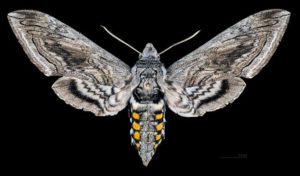This question was submitted by Jerrilee and researched and answered by Advanced Master Gardener Elaine.
What is your question for a Master Gardener?
There is a huge green caterpillar on my tomato plant with white things (looks) like eggs covering it?

The caterpillar you referred to in your question is likely a Tomato Hornworm (Manduca quinquemaculata) or it’s close relative the Tobacco Hornworm (M. sexta). They both feed on plants from the Solenaceae family which include tomatoes, eggplant, peppers, and tobacco. The Tomato Hornworm has diagonal white stripes along the length of its body and the Tobacco Hornworm has V- shaped markings along it’s body. The adult form of the Tomato Hornworm is the Five Spotted Hawkmoth, sometimes referred to as a hummingbird moth.
The white structures you saw on the Hornworm on your tomato plant are, indeed, eggs and you are in luck. The Hornworm has several what we call “biological controls” in nature. More than likely, the eggs were laid by a parasitoid wasp with the biological name of Cotesia congregatus. As the larvae of these wasps grow, they consume the internal organs of the Hornworm and it eventually dies. The hatching wasps will not bother your tomato plant. The Hornworm, however, can consume a lot of the Tomato leaves, causing the plant to weaken. Therefore, it is recommended that you do not remove the Hornworm if you see eggs on it. Because the life cycle of the wasp is dependent on the Hornworm, you want to let the eggs hatch so there are more wasps to control the population of Hornworms. For Hornworms you find that have not been parasitized with eggs, you can remove them and put in soapy water. All the sources I found did not recommend insecticides and suggested that they be used as a last resort. Remember, most insecticides are not selective so you would be killing beneficial insects along with the Hornworm. And in this case, that wasp is considered a beneficial insect.
Attached is a picture of the moth that the Tomato Hornworm turns into if the wasp doesn’t find it first.
Thank you for visiting our website.
Elaine; Hancock County Master Gardener Association
